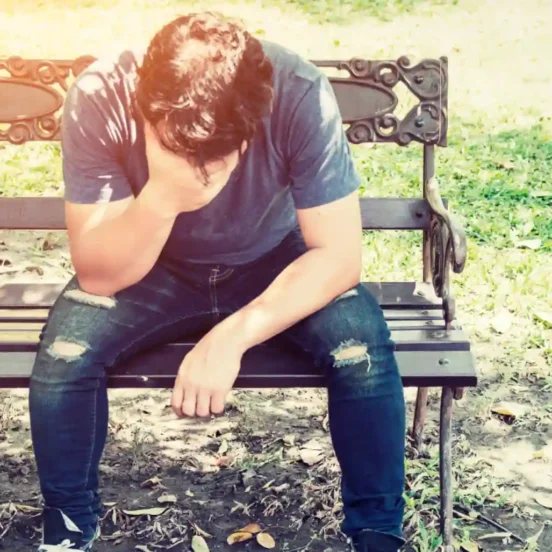What is Spiritual Depression? Understanding Causes Symptoms and Coping
At its core, spiritual depression encompasses a profound sense of disconnection from one’s faith and spiritual vitality. Rooted in the realm of Christianity, spiritual depression entails feelings of alienation from God, struggles in prayer and spiritual study, and a general lack of joy in religious practices. It is not a new phenomenon; references to spiritual despondency can be found in ancient texts, such as the Bible’s Psalms.
While religious leaders often recommend remedies such as prayer and seeking Christ, scholars, and mental health experts acknowledge the complexity of spiritual depression. They emphasize the importance of distinguishing between spiritual struggles and clinical depression, recognizing that while faith can provide solace, professional support may also be necessary for comprehensive healing.
This acknowledgment underscores the need for an integrated approach that respects both the spiritual and psychological dimensions of the human experience.
Understanding Spiritual Depression
Understanding spiritual depression requires a nuanced examination of its multifaceted nature. Rooted in the realm of faith and spirituality, spiritual depression manifests as a profound sense of disconnection from one’s beliefs and practices. Individuals experiencing spiritual depression may find themselves grappling with doubts, struggles in prayer, and a pervasive feeling of spiritual emptiness.
This phenomenon is not limited to moments of personal crisis but can arise from various life challenges, including existential questioning and fixation on past sins. Scholars and mental health experts suggest that spiritual depression should be approached with sensitivity and compassion, acknowledging the complex interplay between religious beliefs and mental health.
By understanding the unique dynamics of spiritual depression, individuals and caregivers can better navigate this challenging terrain and seek appropriate support and guidance.
What is the Spiritual Root of Depression?
At the heart of spiritual depression lies a complex interplay of existential questioning, doubt, and a perceived distance from one’s faith. Individuals grappling with spiritual depression may find themselves questioning the meaning of suffering, their life’s purpose, or the existence of a higher power.
This internal turmoil can lead to feelings of hopelessness, confusion, and a sense of abandonment by the divine. Moreover, fixation on past sins or perceived inadequacies may exacerbate feelings of guilt and spiritual despair.
Recognizing the spiritual roots of depression is crucial for addressing its underlying causes and facilitating healing.
Existential questioning: Individuals may struggle with fundamental questions about the nature of suffering, their purpose in life, and the existence of a higher power.
Doubt and uncertainty: Spiritual depression often involves doubts about one’s faith, beliefs, or the goodness of God, leading to feelings of confusion and disillusionment.
Fixation of past sins: Guilt and remorse over past mistakes or perceived inadequacies can contribute to a sense of spiritual despair and unworthiness.
Feelings of abandonment: Individuals may feel disconnected from their faith or perceive God as distant and unresponsive, leading to feelings of isolation and abandonment.
What is the Relationship Between Spirituality and Depression?
The relationship between spirituality and depression is intricate, with spiritual beliefs and practices often influencing emotional well-being. While spirituality can provide solace, meaning, and a sense of purpose, it can also be a source of conflict, doubt, and existential questioning during periods of depression.
For some individuals, a strong spiritual connection may serve as a protective factor against depression, offering comfort and support during challenging times. However, spiritual struggles, such as feelings of guilt, doubt, or perceived distance from one’s faith, can exacerbate depressive symptoms.
Understanding the complex interplay between spirituality and depression is essential for providing holistic support and promoting mental and spiritual well-being.
| Aspect | Impact on Depression |
| Spiritual beliefs | Can provide comfort and meaning but may also lead to doubts and conflicts during depressive episodes. |
| Religious practices | Participation in religious activities can offer social support and a sense of community, potentially alleviating depressive symptoms. However, the inability to engage in these practices due to depression may lead to feelings of isolation. |
| Existential questions | Depression often prompts individuals to grapple with existential questions about the meaning of life, suffering, and the nature of existence, potentially intensifying spiritual distress. |
| Coping mechanisms | Spirituality can serve as a coping mechanism for managing stress and adversity, offering individuals a sense of hope and resilience in the face of depression. However, spiritual struggles may impede effective coping and exacerbate depressive symptoms. |
| Sense of purpose | A strong sense of purpose derived from spirituality can provide motivation and direction, buffering against depression. Conversely, feelings of spiritual emptiness or loss of purpose may contribute to depressive symptoms. |
How Does Depression Affect Spiritual Health?
Depression can significantly impact spiritual health, disrupting one’s connection to faith and spiritual practices. Individuals experiencing depression may find it challenging to engage in prayer, meditation, or other religious activities that once brought them solace and meaning.
Feelings of hopelessness, guilt, and spiritual emptiness can overshadow one’s sense of faith, leading to a perceived distance from God or a loss of belief altogether. Moreover, depression may exacerbate existential questioning, causing individuals to wrestle with doubts about the purpose of suffering and the existence of a higher power.
This disruption in spiritual well-being can further contribute to feelings of isolation and despair, intensifying the overall burden of depression. Recognizing the impact of depression on spiritual health is crucial for addressing the holistic needs of individuals struggling with mental illness.
Spiritual Depression Symptoms
Spiritual depression is a distinct experience from clinical depression, though they can co-occur. It’s characterized by a deep sense of emptiness, a loss of meaning and purpose, and a disconnection from a higher power.
Here are some signs that you may be experiencing spiritual depression:
- A deep sense of inner emptiness: This feeling may be accompanied by a loss of interest in things that you once enjoyed, or a general sense of apathy.
- Feeling disconnected or abandoned by God: You may feel like you’ve lost your faith, or that God is no longer listening to your prayers.
- Loss of interest in previously enjoyed spiritual activities: This could include prayer, meditation, attending religious services, or reading scripture.
- Persistent doubt or questioning of your spiritual or religious beliefs: You may start to question the teachings of your faith, or even the existence of a higher power altogether.
- Hopelessness or lack of meaning or purpose: You may feel like there’s no point in anything, and that your life has no meaning.
- Guilt and shame due to perceived moral failings: You may feel like you’ve done something wrong to deserve this feeling of emptiness.
- Isolation from a spiritual community: You may withdraw from your religious community or stop attending services altogether.
If you’re experiencing any of these symptoms, it’s important to reach out for help. Here are some resources that can help:
- A spiritual leader or counselor
- A therapist
- A support group for people with spiritual depression
Where it Comes From?

Spiritual depression can arise from various sources, often stemming from a disconnect or questioning of your spiritual path. Here are some common causes:
Life Challenges: Difficult experiences like illness, loss of a loved one, or major life changes can trigger feelings of despair and make you question your faith or purpose.
Existential Doubts: Contemplating big questions about life, suffering, and the afterlife can lead to uncertainty and a sense of meaninglessness.
Religious Doubt: Witnessing evil or suffering in the world or struggling to reconcile your beliefs with personal experiences can lead you to doubt your religious teachings or the existence of a higher power.
Neglecting Spirituality: When you become busy or prioritize other aspects of life, neglecting practices like prayer, meditation, or religious services can weaken your spiritual connection and lead to emptiness.
Fixation on Past Mistakes: Feeling excessive guilt or shame over past actions can create a burden and disconnect you from forgiveness and inner peace.
Spiritual Trauma: Experiencing abuse or negative religious experiences can leave lasting scars and damage your spiritual well-being.
Underlying Mental Health Conditions: Sometimes, spiritual depression can coexist with clinical depression or anxiety. It’s important to consult with a mental health professional to rule out any co-occurring conditions.
Spiritual Depression: its Causes and Cure

Spiritual depression, characterized by a profound sense of disconnection from one’s faith and spiritual vitality, is a complex phenomenon that has roots deep within the human experience.
Causes of Spiritual Depression:
Life Challenges: Everyday trials and stressors, such as job loss, financial difficulties, or relationship concerns, can contribute to feelings of spiritual distress.
Fixation on Past Sins: Lingering guilt and remorse over past mistakes or perceived inadequacies can weigh heavily on the soul, fostering a sense of spiritual despair.
Neglect of Spirituality: Prioritizing worldly cares over spiritual practices, such as prayer, meditation, and communal worship, can lead to a gradual erosion of spiritual vitality.
Religious Doubt: Confronting questions about the nature of suffering, the existence of a higher power, or the purpose of life can trigger feelings of doubt and uncertainty.
Excessive Self-Examination: Endlessly scrutinizing one’s flaws and shortcomings without finding a resolution can intensify feelings of spiritual distress and hopelessness.
Cure for Spiritual Depression:
While navigating spiritual depression can be a challenging journey, there are paths toward healing and restoration.
Faith and Prayer: Reconnecting with one’s faith and seeking solace in prayer can offer a source of comfort and strength during times of spiritual turmoil.
Positive Self-Talk: Cultivating a mindset of self-compassion and affirming one’s worth and purpose in the eyes of God can counteract feelings of hopelessness and inadequacy.
Learning from Mistakes: Embracing the opportunity for growth and redemption, rather than dwelling on past sins, can foster a sense of forgiveness and renewal.
Seeking Support: Engaging with supportive faith communities and seeking guidance from spiritual leaders can provide a sense of belonging and understanding.
Professional Help: Recognizing the importance of mental health support, individuals experiencing spiritual depression should not hesitate to seek assistance from trained therapists or counselors.
How to Overcome Anxiety Spiritually?
Overcoming anxiety through spiritual means involves cultivating a deep sense of trust and surrender to a higher power. Individuals grappling with anxiety can find solace in spiritual practices such as prayer, meditation, and mindfulness, which promote a sense of peace and inner calm.
Connecting with one’s faith community and drawing strength from shared beliefs and support networks can also provide a source of comfort and reassurance. Additionally, embracing spiritual teachings that emphasize the impermanence of life and the importance of living in the present moment can help alleviate anxiety by shifting focus away from future uncertainties.
By nurturing a strong spiritual foundation and seeking guidance from higher sources, individuals can navigate the challenges of anxiety with resilience and grace.
Ending Note
Spiritual depression presents a profound challenge to individuals navigating the intricate terrain of faith and mental health. By delving into its causes, understanding its impact on spiritual health, and exploring avenues for healing, we shed light on this complex phenomenon. It’s evident that while spiritual depression may stem from various sources, including life challenges, fixation on past sins, and religious doubt, there are pathways toward restoration and renewal.
Through faith, prayer, positive self-talk, seeking support, and professional help when needed, individuals can embark on a journey of healing and rediscover the joy and vitality of their spiritual lives. Remember, you are not alone in your struggles, and there is hope for a brighter tomorrow.















